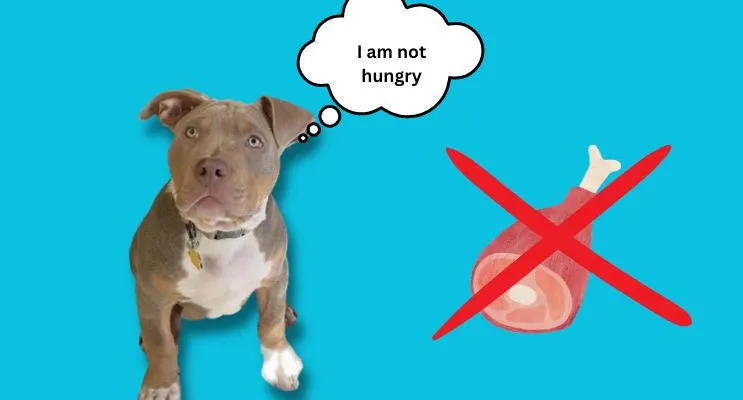If your American Bully suddenly stops eating, it can be quite a stressful and worrying situation for you. You might be wondering why your American Bully is not eating.
It can be due to a variety of reasons, such as health issues, dental problems, or perhaps some medication.
Don’t worry; in this article, we will dive deep and discuss what could be the possible reasons and how you can handle these situations effectively.
So, let’s keep going!
Contents
10 Reasons Why My American Bully Is Not Eating

If your American Bully isn’t eating, it’s important to consider several potential factors.
Illness
If your American Bully doesn’t want to eat, it could be because of sickness. Think of it like when you are sick, for example, if you have a fever or a cold, you don’t feel like eating, and it is the same for our furry buddies.
If your American Bully is sick, there could be a temporary loss of appetite. It’s important to take your dog to the vet to figure out what’s going on.
The vet might conduct tests to find out what’s wrong and based on the severity of the health issue they will prescribe medicine for your dog.
It’s really important to deal with these issues quickly, as they can get worse if ignored.
Stress
While sickness is a straightforward reason for your American Bully not wanting to eat, stress is also a big factor that can mess with their eating routine.
Things like changes in their surroundings, adding new family members (whether pets or people), or even just shaking up their daily routine can make your dog feel uneasy.
Stress can show up in different ways, and one common sign is a loss of appetite.
Your job is to figure out what’s stressing out your dog and make their environment more stable and comforting.
For example, if you’ve recently moved, give your Bully extra attention and familiar things. If you’re introducing new pets or family members, do it slowly.
Stick to regular feeding times and routines to keep things consistent.
If stress seems to be sticking around and affecting their eating, it’s a good idea to talk to your vet.
Change in diet
If you suddenly change your American Bully’s food, they might not feel like eating because they need time to get used to the new taste and texture.
Dogs, just like people, have their favorite flavors, and introducing something new can take a bit of time. If you’ve switched their diet, whether it’s for health reasons or just a change in preference, it’s important to do it slowly.
Start by mixing a bit of the new food with their old one, and then slowly increase the amount of the new food over a few days. This gradual change helps avoid stomach problems and lets your Bully get used to the new taste.
Dental issues
Just like us, if your American Bully is suffering from dental problems, they may not want to eat because of the pain or discomfort in their mouth caused by these issues.
Dogs are good at hiding their pain, so you might not notice it right away.
Things like tooth decay, gum disease, or a broken tooth can make your dog feel really uncomfortable. If you see your Bully drooling more than usual, having bad breath, or pawing at their face, these could be signs of dental issues.
Make sure to talk to your vet. They can check your dog’s teeth thoroughly. Finding and treating dental problems early is important to prevent more serious health issues and to get your furry friend back to enjoying their meals.
Medication side effects
Occasionally, the medications prescribed to your American Bully for various health issues can have the unintended side effect of reducing their appetite.
It’s important to recognize that while these drugs are vital for treating specific conditions, they can also impact your dog’s desire to eat.
If you’ve noticed a marked decrease in your Bully’s eating habits after starting a new medication, it’s worth discussing this with your vet.
They can evaluate whether the medication is the culprit and might adjust the dosage or switch to an alternative that doesn’t affect appetite as much.
Always remember, it’s crucial to never stop or change your dog’s medication without professional guidance—doing so could harm their health more than a temporary loss of appetite.
Food allergies
Food allergies can make your American Bully not want to eat. These allergies can cause anything from mild discomfort to serious stomach problems.
If your Bully is allergic to something in their food, you might see signs like itching, skin rashes, ear infections, or diarrhea.
It’s really important to figure out what’s causing the allergy in order to properly address it. It could be a type of meat like beef or chicken, grains, or certain additives.
Your vet can help by using an elimination diet or allergy testing to find the culprit.
Once you know what it is, avoiding that ingredient should help your Bully feel better and start eating again.
Behavioral Issues
Aside from physical health issues, your American Bully’s loss of appetite may arise from behavioral problems.
Just like children, some dogs can be very picky eaters. Other reasons could be that they are not comfortable with the presence of another dog or person.
Maybe they feel uneasy about the bowl you use to feed them, or they may refuse to eat if you’re not present.
As we have already discussed, a loss of appetite can be caused by illness. Therefore, it is important to rule out these possibilities before assuming it is due to behavioral issues.
Digestive problems
Digestive problems, like food intolerances or infections, can make your American Bully not want to eat.
When their stomach isn’t working well, it can be uncomfortable or painful, making them avoid food.
Keep an eye out for other signs like vomiting, diarrhea, or acting tired, as these can come with digestive issues and mean a trip to the vet is needed.
If your Bully can’t eat, it might be because of more serious things like inflammatory bowel disease or obstructions. If not treated, these can affect their health in the long run.
Being understanding and taking action is important to find and treat any health problems that might be making them not want to eat.
Infections
Infections, like bacterial or viral illnesses, can make your American Bully not want to eat, and it’s a common reason for them to stop eating.
When your dog is fighting an infection, its body uses a lot of energy to boost the immune system, sometimes affecting their normal eating habits.
If you notice symptoms like fever, tiredness, or a runny nose along with your dog not eating, it could mean they have an infection that needs the vet’s attention.
It’s really important to notice these signs early and get professional help. If the vet finds an infection, they might give antibiotics for bacterial ones or suggest care to help with viral illnesses.
Getting the right help in time can make a big difference in your pet’s recovery.
Tips To Handle a Bully Dog Who Isn’t Eating

Consult a veterinarian
When your American Bully won’t eat, it’s crucial to see a vet. They can check your dog and create a plan that fits their needs.
The vet can figure out if your Bully’s not eating because of a medical issue or something more serious. They’ll look at your dog’s history, do necessary exams, and might suggest tests to find the cause.
Don’t wait to visit the vet, as catching problems early is important. Your vet’s advice will make sure you’re not overlooking something serious.
They can also help with changes in diet, feeding methods, and prescribe medications if needed.
Check for dental issues
When figuring out why your American Bully isn’t eating, don’t forget about their teeth. Dental problems can cause pain and make them not want to eat.
Things like tooth decay, gum disease, or a broken tooth can make mealtime uncomfortable. Check your dog’s mouth for red gums, bad breath, or any signs of mouth injury.
If your Bully doesn’t want you to look in their mouth, it’s a sign they might be feeling dental pain.
In these cases, it’s important to go to the vet right away. The vet can check your dog’s teeth, suggest treatment, or recommend a special dental diet to fix the issue and get your dog eating again.
Review the dog’s diet
Check what you’re feeding your American Bully to understand why they might not want to eat.
Problems like not getting the right nutrients or having trouble with certain foods can affect their appetite.
Make sure you’re giving them a balanced diet meant for their age, size, and how active they are.
Feeding Schedule
It is important to have a fixed schedule for feeding instead of feeding them at random times, as random feeding can lead to eating issues.
It is important to understand that there is no fixed-time that works for every dog; it is your duty to find out which time works for your bully to eat.
Make sure to feed them at that exact time every single day.
Monitor for behavioral changes
Pay close attention to your American Bully’s behavior and mood. Look out for any changes that might suggest underlying issues affecting their appetite.
Things like less activity, more aggression, or unusual tiredness can be warning signs. See if they’re still interested in their favorite activities or if they’re keeping to themselves. Sometimes, a dog not wanting to eat isn’t just about food—it could be a sign of a bigger problem.
If you notice these changes, don’t ignore them. It’s important to act quickly, starting with a thorough check-up from your vet.
Getting help early can be crucial in dealing with potential health problems, emotional stress, or things in their environment that might be affecting their desire to eat. Remember, you’re their main advocate and source of comfort.
Ensure a calm feeding environment
Create a calm and quiet space for your American Bully to eat, so they feel safe and relaxed during meals.
Choose a peaceful area in your home, away from noise and people walking around. It’s important to keep the location and feeding times consistent.
Be aware of the environment; a noisy or chaotic atmosphere can stress your dog, making them not want to eat.
Avoid loud sounds and keep unfamiliar people or pets away from their eating area. If you have other pets, consider feeding them separately to avoid competition or intimidation, which can be upsetting.
Your understanding and attention to these details can help bring back your Bully’s appetite.
Final Thoughts
So here you have it. I have explained some reasons why your American Bullies might not eat and how you can manage it.
The reason behind your American Bully not eating could range from something as small as being bored with the food to severe health issues.
If your Bully isn’t eating much, don’t worry too much. Give the tips I mentioned a try, and always check with your vet to make sure there’s no health problem.
Just be patient and caring. With a little attention, you’ll figure out why your furry friend isn’t eating and get them back to being happy and healthy.
Reference-

